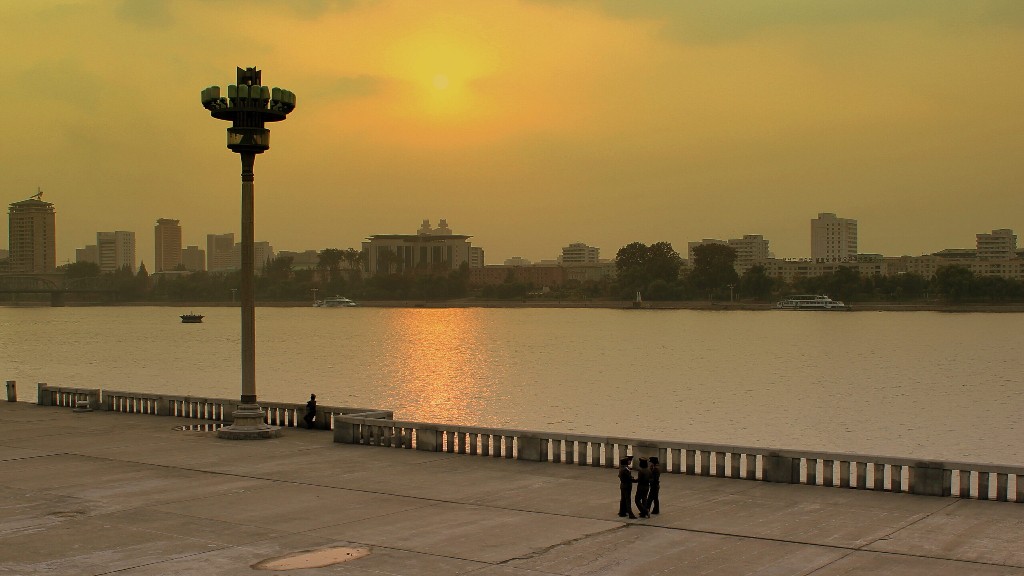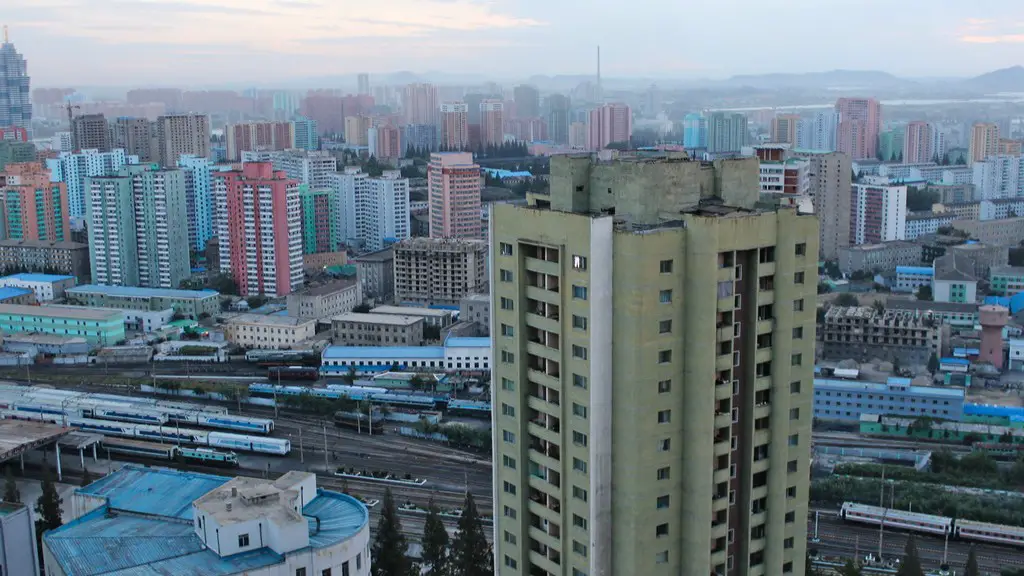Background Information
North Korea is an isolated and reclusive nation, located in East Asia, on the northern part of the Korean peninsula. It is bordered by two other countries: South Korea to the south and China to the west, and Russia to the northeast. North Korea is a communist state, with a population of more than 25 million people. Since 1948, in the aftermath of World War II, the country has been ruled by the Korean Workers’ Party, a Marxist–Leninist political party. It is one of the most regimented and repressive states in the world, with an extreme form of authoritarianism and strict social control.
What’s North Korea Doing?
North Korea’s activities have for long been shrouded in secrecy, and its behavior has often been seen as provocative and erratic. In recent years, the regime has made several bold moves which have brought it into the spotlight. One of these is its nuclear weapons program. In 2006, North Korea tested its first nuclear weapon, and in the subsequent years, it has continued its development of nuclear weaponry. It is estimated that it now possesses a range of short, medium, and intercontinental range ballistic missiles, with some of the latest ones being capable of reaching the United States.
More recently, North Korea has also become increasingly defiant in its foreign policy. In recent months, it has adopted a very aggressive stance against the United States and its allies, carrying out a multitude of missile tests and threatening to use nuclear weapons. It has also taken aggressive actions in the South China Sea, and increased its cyber-attacks on other countries. These activities have caused much alarm in the international community, and have raised tensions in the region.
Economy And Sanctions
The economic situation in North Korea is precarious. The country is largely dependent on China for economic support, and its economy is heavily sanctioned by the international community. Sanctions are aimed at limiting the regime’s access to resources, such as oil and other commodities, and have had a significant impact on the country. Although the government has attempted to develop a free market economy in recent years, the country remains far from prosperous, and it is still largely reliant on foreign aid.
Humanitarian Issues
One of the most important, yet often overlooked, aspects of life in North Korea is the humanitarian crisis. North Korea is one of the poorest countries in the world, and much of its population lives in poverty. The country also has one of the worst human rights records in the world. In recent years, the regime has been accused of widespread human rights violations, including torture, arbitrary detention, and a host of other abuses.
Change In Leadership
In 2011, North Korea’s leader, Kim Jong Il, passed away, and his son, Kim Jong Un, succeeded him. Since then, there has been a shift in North Korean policy, with the regime becoming more open to dialogue and negotiations with foreign countries. This has led to some tentative diplomatic breakthroughs, such as the recent summit between the leaders of North and South Korea, and the meeting between President Donald Trump and Kim Jong Un.
The Road Ahead
The future of North Korea remains uncertain. The regime’s policies have been unpredictable, and it is unclear what lies ahead. It is unlikely that the regime will give up its nuclear weapons, and its hostility towards the United States and its allies shows no sign of abating. At the same time, the recent developments have opened up possibilities for dialogue and diplomacy, which could be a way forward in the future.
Analysis Of Behavior
North Korea has been labeled as one of the most volatile and unpredictable nations in the world. Its behavior has often been seen as confrontational and even belligerent, and it is clear that the regime does not take kindly to foreign interference or criticism. Many believe that the regime is driven by the desire to project strength and maintain power, and that its aggressive rhetoric and missile tests are meant to raise its profile and intimidate its adversaries.
At the same time, it is important to note that the regime has also shown a willingness to come to the negotiating table, and that it has displayed some flexibility in recent years. Whether this openness will continue remains to be seen, and much will depend on how North Korea’s relations with the United States unfold in the coming months and years.
Economy And Sanctions Impact On North Korea
The economic sanctions that have been imposed on North Korea have had a devastating impact on its economy. The country has been cut off from the global economy, and this has resulted in a dramatic decline in its GDP and national income. The sanctions have also reduced the availability of essential goods and services, such as food, medicine and fuel, which has had a dire effect on the general welfare of the population.
At the same time, it should be noted that some of the economic sanctions have also been lifted in recent years. This has paved the way for some tentative economic cooperation between North Korea and some of its regional neighbors, and this could lead to some economic growth in the future.
Reaction Of International Community
The international community has been keeping a close eye on North Korea’s activities. Many countries, including the United States and its allies, have condemned North Korea’s nuclear program, and some have imposed additional economic sanctions in response. However, some countries have also shown a willingness to engage in dialogue and negotiations with the regime.
In spite of this, the situation remains fragile, and much will depend on how North Korea responds to pressure in the future. It is also important to note that while international condemnation and sanctions can help to curb the regime’s activities, in the long term, a lasting solution will require a genuine commitment to peaceful dialogue and international cooperation.
Political Relationship With The US
The relationship between North Korea and the United States is at an all-time low. The regime’s recent belligerent behavior, including its nuclear and missile tests and threats of war, coupled with President Trump’s rhetoric and tough stance, has seen tensions soar in recent months. Given the regime’s history of provocation and belligerence, the US government has been hesitant in engaging in negotiations with North Korea.
At the same time, it is important to note that the US has not ruled out the possibility of talks. It has also held a number of informal meetings with North Korean officials in recent years, and there has been talk of a possible summit between Trump and Kim Jong Un. Whether this will come to fruition, remains to be seen.


